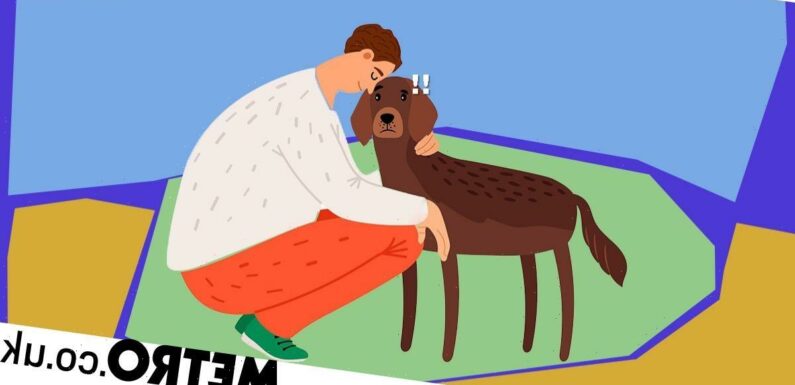
Getting a pet is super exciting, and dogs are up there with the best of them.
Loving, playful and cuddly, part of the dog ownership dream is that you have a little pal who’s your very best mate.
But what happens if your four-legged friend is best pals with someone else?
Claire Haynes, who’s a Behaviour Service Delivery Partner with charity Blue Cross, explains that being your dog’s legal owner doesn’t change the fact that they’ll bond with whoever is ‘spending time and interacting with them positively.’
She tells us: ‘Dogs are a social species and often love spending time with people.
‘We can build relationships with our dogs through doing things with them that they enjoy; depending on your dog this might be things like going for walks, training, having grooming sessions, being given attention, and playing with toys.
‘Sometimes dogs will favour certain activities, and you can identify this by watching their body language and how they respond to these scenarios. So if every time your get your harness for your dog’s walk, your dog bounds towards you, nudging your hands with the harness, wagging their tail in circles like a helicopter, it would suggest they enjoy going for walks.
‘Similarly, there will be things our dogs favour less – each dog is unique but some dogs might find the vets worrying, or having their nails clipped. Depending what each human does with a dog, can affect the strength or relationship they build with you.’
Regardless of the happy-go-lucky, loving reputations dogs have, your pet is still an individual.
Esme Wheeler, dog welfare expert from the RSPCA’s companion animals department says: ‘Every dog is different – with a unique personality, likes and dislikes.
‘The RSPCA tries hard to match adopters with the perfect rescue pet – but some relationships can take a little longer to develop than others; and it’s important owners don’t get frustrated if the dog appears to be more worried around a certain person than others.
‘Just like humans, dogs are emotional and complex animals. They need time to adjust to different people; environments and routines; so it is also important they’re given time, and that owners are patient and understanding.
Watching your dog’s body language can also help you determine whether they’re stressed or worried about something.
Claire adds: ‘For example, if you use a harness with your dog but when you try to put this on. they are crouching, shaking, with their tail tucked under, it would suggest they’re uncomfortable.
‘To try and continually build a positive relationship with your dog, spend time with them doing what they enjoy, and help them with things that worry them.’
Esme says: ‘The RSPCA urges owners to understand subtle signs of a nervous or anxious dog. This can include an averted stare, lip licking, yawning when not tired, unexplained panting, and pinning their ears back – and could help explain the trigger for a dog’s concern.
‘There are exercises and training activities owners can do to improve a nervous dog’s behaviour, which may help the bond they have with their owner. Such exercises can include carefully controlled exposure to certain situations and socialisation programs, but these should always be done under the guidance of a recommended certified clinical animal behaviourist.’
Just remember, the most important thing at the end of the day is that your dog is living a good life.
‘Ultimately no matter who you believe is your dog’s “favourite person”, the most important thing is that they are happy and healthy,’ says Claire.
‘Should your dog be worried by things you’re doing, or you think they’re uncomfortable with certain things in their life, be sure to contact an accredited animal behaviourist via the Animal Behaviour & Training Council.’
Esme agrees that in some cases, getting professional help may be called for.
She stresses: ‘Anyone worried about the relationship with their dog can also work with a behaviour expert, who has the appropriate knowledge and skills to help.
‘Owners should speak with their vet who can then refer them on to a certified clinical animal behaviourist.
‘Exercises and training activities can take a lot of patience, understanding and consistency to ensure their success. However, attending regular training classes can help improve the relationship and communication between you and your dog.
‘By learning to read the behavioural signs of your dog, more importantly, the subtle ones, and avoiding the situation before nervous behaviour develops, will help your dog to begin to learn to trust you and realise that you will not be forcing him/her into any situations they are nervous of.’
Do you have a story to share?
Get in touch by emailing [email protected]
Source: Read Full Article

